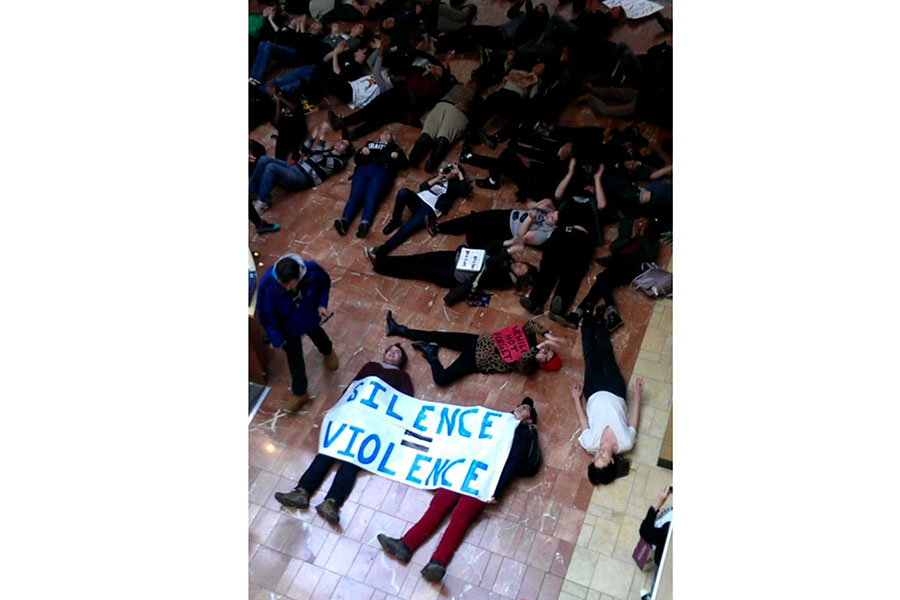Know/inform/care
From the roads of Rockwood to the epidemics in Africa, current events effect us all.
Protesters in support of Mr. Michael Brown, shooting victim, laid down in the West County Mall on Black Friday for four minutes in representation of the four hours the Ferguson police left Mr. Brown lying dead after he was shot. Nov. 28.
December 5, 2014
Local
Inform: Monday, Dec. 1, was the first snow day of the season for many schools in the St. Louis area. Dr. Eric Knost, superintendent, released a statement about the decision to call off school. Dr. Knost made it clear that the main factor that played into the decision was the lack of preparedness for the unexpected weather.
Care: It’s important for students to be able to go to school, but at the same time students need to be safe.
State
Inform: Protesters made their way through West County over the weekend. Protesters temporarily occupied The Walmart in Manchester on Thanksgiving, sparking an increased police reaction at the popular supermarket. Both the West County Mall and the Chesterfield Mall closed down for small periods of time. All of this occurs amid the announcement of a 120 mile march to Jefferson City in honor of Michael Brown and outcries about injustice and the lack of an indictment against Officer Darren Wilson, formerly Ferguson police. These particular occupations, however, were not part of the march but instead a part of an initiative to stall Black Friday sales, often one of the most lucrative days of the year for businesses.
Care: When the protests in Ferguson first began, the situation may have felt far from the Eureka. However with the recent encroachment of protesters in West County it is clear that there is enough power behind the cause to make it into West County and further.
National
Inform: The FDA is reconsidering its 31-year ban on allowing blood donations from men who are gay or bi-sexual and more importantly have had sexual intercourse with another male since the outbreak of AIDS in the 1970s. Just last month a panel of blood safety experts voted in a near unanimous vote of 16-2 in favor of doing away with the old policies concerning LBGT males who wish to donate blood. The panel instead suggested that there be a one-year blackout in which those who have had sexual intercourse with another male with in the last year are unable to donate rather than any male who has had sexual intercourse with another since the late 1970s. No official word has been made on what a policy would look like yet. Additionally, the American Medical Association cites that the ban is no longer supported by science given the advancements in the testing of HIV.
Care: This could pose several problems, but it is possible that the benefits sharply outweigh the potentially negative consequences. For starters, opening up donations to another group previously isolated for 30 years could cause an influx in donations during a time period in which organizations are asking for blood donations more than ever before, dropping 10 percent in 2012. Blood would be more readily available, saving more lives. However, while the testing of HIV is more advanced, it still needs to be confirmed whether or not HIV could slip through. Blood donations caused a spread in HIV in the late 1970s and early 1980s. Events like this raise questions concerning the possibility of this occurring again. EHS has a long-standing tradition of an annual blood drive; expanding those who can donate would increase its contributions.
International
Inform: While the FDA is reconsidering it’s ban on blood donations, HIV has been reported as the second highest killer of teens in South Africa. HIV was the third highest killer of civilians over all in South Africa during 2013, a 3 position increase from the year prior. According to the United Natios, 18 percent of the population of South Africa–approximately 6 million people–are infected with HIV. This effectively makes it the country with the highest infection count. Additionally, HIV killed roughly 458,000 people in South Africa during 2013. However, a recent study shows that HIV is evolving into a more mild form. The study cites that HIV may evolve to become virtually harmless. It is already taking longer to evolve into AIDS than it was at the advent of the AIDS epidemic.
Care: This new study could lead to the statistic in South Africa to dwindle in the coming years. Additionally, the advent of a mild form of HIV could potentially not be a worry of the population of the globe or EHS in 20 years. What was once an international pandemic may fizzle and fall flat ultimately.















